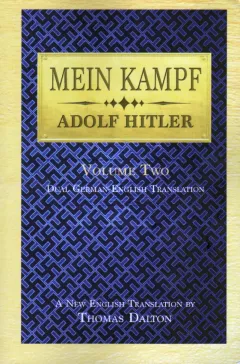Chapter 12, Vol II: The Trade Union Question summary
12.1 In the first volume of this book, I explained that unless measures are undertaken to change the employer's attitude toward the worker … the worker has no recourse except to appeal to his equal rights as a contracting party within the economic sphere. I further stated that this would be in the interests of the national community if social injustices could be addressed that would otherwise cause serious damage to the whole social structure. Moreover, the worker would always find it necessary to undertake this protective action as long as some among the employers had no sense of their social obligations, or even elementary human rights. I concluded by saying that if such self-defense was considered necessary, it could only exist in the form of a workers' association on a trade-union basis.
Now it was necessary to find a clear and precise formula regarding these problems.
As things stand, I'm convinced that we cannot dispense with unions. When the broad masses of a nation see their vital needs satisfied through a sound trade union movement, the whole nation will be exceptionally strengthened in its struggle for existence.
The National Socialist movement, which aims at establishing a National Socialist folkish State, must always bear in mind that every future institution in that state must grow from the movement itself. It's a great mistake to believe that we can bring about a definite reorganization without the help of a certain reserve stock of men who have been trained in their convictions. [...] This organization must possess National Socialist life in itself, so as to create a living National Socialist State.
12.2 The trade union is not a tool of 'class struggle,' but the Marxists made it into an instrument for use in their own class struggles. They created the economic weapon that the international world-Jew uses for the purpose of shattering the economic foundations of free and independent nation states, and for destroying national industry and trade, thereby enslaving free peoples to serve a supra-state Jewish world-finance.
12.3 By contrast, the National Socialist trade union will enhance the security of the national economic system itself, reinforcing it by the elimination of all those anomalies that ultimately exercise a destructive influence on the national body.
National Socialist employees and employers are both servants and guardians of the whole national community. The large measure of personal freedom accorded to them for their activities can be explained by the fact that individual efficiency is more enhanced by a generous measure of freedom than by coercion from above. Furthermore, such freedom promotes the natural selection process that brings forth the ablest, most capable, and most industrious people.
The Economic Chamber's duty will be to keep the national economy operating and to remove any injuious defects or errors. … Executives and employees will no longer be drawn into a mutual conflict over wages and pay scales, damaging the economic interests of both. The iron principle must be observed, that the interests of the Fatherland come before party.
It would be senseless to have a National Socialist union alongside other unions. It must have a thorough feeling for its philosophical task and the resulting obligation not to tolerate other similar or hostile organizations.It can come to no understanding and no compromise with related efforts but must assert its own absolute and exclusive right.
Today the National Socialist movement must fight against a long-standing and monstrous organization that is developed down to the smallest details. The Marxist trade-union fortress can be governed today by mediocre leaders, but it can only be stormed by the dauntless energy and genius ability of a great leader on the other side. If such a man cannot be found, it's foolish to force the issue without adequate replacement.
Here one must apply the maxim that, in life, it's often better to let something go than to try it half-way, due to a lack of suitable forces. We should learn from experience that the more the combined strength of our movement is concentrated on the political struggle, the sooner we can count on success down the line; but the more we prematurely busy ourselves with union, settlement, and other problems, the less will be the benefit for our cause as a whole.
12.4 At that time I had—and still have today—a firm conviction that it's dangerous to mix up a great politico-worldview struggle with economic questions at an early time. This applies particularly to our German people. The economic struggle would divert energy from the political fight. Once the people come to believe that they can buy a little house with their savings, they'll devote themselves solely to this task; no spare time will be left for the political struggle against those who, one way or another, will some day take away their savings. Instead of fighting in the political conflict on behalf of the opinions and convictions they have won, they'll surrender to their 'settlement' idea, and in the end will lose out.
In November 1918, the German people didn't wage any political fight for the future of Germany because they thought they could secure it sufficiently by constructive economic work. We should learn from experience; the more the combined strength of our movement is concentrated on the political struggle, the sooner we can count on success down the line. If our movement takes up the other problems too soon, they will prove a hindrance to the philosophical will.
A National Socialist union movement must declare war against the Marxist unions, not only as an organization, but above all, as an idea. It must strike down the promoter of the class-idea and class warfare, and in its place declare itself as the defender of the occupational interests of the German people.
12.5 All these viewpoints argue, then, against the founding of our own trade unions. Unless, that is, someone suddenly appears who is obviously called by Fate to solve this particular problem. I recommend that our party members remain in the unions for now, while working as destructively as possible. … During the inflation period, the financial advantage to the union from our members was almost zero due to the few individuals in our young movement. But the damage to the union was great because the National Socialist supporters were its sharpest critics.
We acted on these views in 1922. Others thought differently and founded trade unions. They attacked us for being short-sighted and mistaken. But it wasn't long before these organizations disappeared and the same would have happened to us.
End of Chapter 12
- Printer-friendly version
- 377 views





